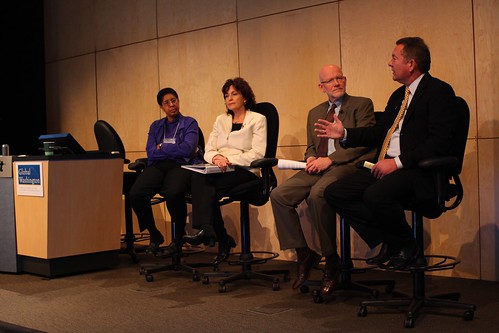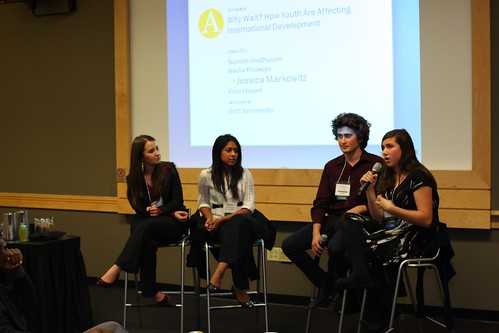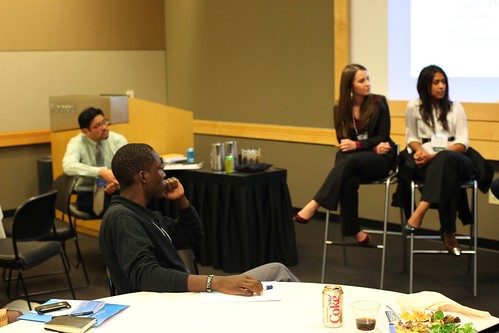Blog
Posted on November 15, 2010

Submitted by Nina Carduner
Karen D. Turner, director at the Office of Development Partners for USAID, discussed how USAID pioneered the concept of public private partnerships in 2001. Yet, moving to partner with businesses has presented a challenge for USAID because often, the drivers for development are very different for private entities and there are many stakeholders to engage from social enterprises and diasporas to local and regional firms. USAID is here to facilitate partnerships. According to Turner, USAID has been successful in building public/private partnerships through internal education about how to meet the needs of the private sector and communicating with private sector about the internal workings of USAID. Both public and private enterprises need to understand the complexity of these partnerships and share with one another the best practices for making them transformational.
Rosemary Barker Aragon of Rotary International underscored the importance of understanding each partner’s area of expertise. For example, Rotary International is organized like a pyramid with the money at the top and many individuals on the ground at the local level in 200 countries. When entities approach Rotarians for partnership, they know they will excel at navigating effectiveness on the local level.
Christopher Elias of PATH discussed the ways in which PATH has successfully partnered with pharmaceutical companies around a common purpose. Uniting around a common purpose can add complexity to a partnership when the purpose relates to the core of a business’ product or service, yet this complexity also raises the level of engagement, which creates more leverage in the shared mission. Elias also credited “the rising awareness of global markets and systems for sustainable solutions” for the increasing the success rate of public/private partnerships. When public entities can recognize market changes, they can innovate and reinvent solutions that have prior success but are tailored to the differences between countries and regions.
NetHope’s Frank Schott gave praise to the expertise that private partnerships have have helped the non-profit achieve its mission to help facilitate the appropriate use of information and communication technologies in remote areas and during relief efforts. NetHope grew out of the resource pooling of seven non-profits. Pooling their resources enabled NetHope to attract private partnerships. He explained that, “while we use and appreciate [Microsoft and Cisco] products, the biggest contribution from them has been their expertise. Our supporters aren’t just donors, they are providing us with the technology, but more importantly, the expertise we need to leverage our programs and drive our mission.”
Posted on November 15, 2010

Submitted by Nina Carduner
Rogers Weed gave the closing keynote for the first day of the Global Washington Conference. As the director of the Washington State Department of Commerce, he summarized the current status of Washington’s economy as well as the increasing importance of global development for growing and improving the state of jobs in Washington.
After losing 3 million jobs in a period of 6-9 months, Washington has been hard hit by the recession. While the state is now gaining in employment, it is doing so very slowly. In Washington, the highest unemployment rates exist in the NE and SW counties of the state. The governor has been forced to make deep budget cuts and the state budget is in crisis. A big chunk of this budget is protected by the state constitution, which is focused on K-12 education and this limits flexibility. Unfortunately, the latest election results have squashed efforts to create opportunities for new revenues with sale taxes.
Weed did offer some good news for the state. Global trends including prevalence of software, the clean energy transition, and also the increasing influence of Asia are set to disproportionately benefit Washington. Thanks to the abundance of international non-profits and the general growth of development organizations in the state of Washington, Weed explained the development sector will enable Washington to achieve its goals of increasing international exports, study abroad programs, and building a broader international agenda. Meeting these goals, Weed stressed, will be essential for improving and growing jobs for the state and improving our local economy.

Posted on November 15, 2010

Submitted by Melissa Bird-Vogel Wilkes
Highlighting the emerging role of youth in international development, this panel offered insight into best practices, challenges and the future impact of youth involvement in finding solutions to global social and economic issues. Four young leaders who hold senior level or founder positions at Washington-based organizations lead the conversation.
Key takeaways from the conversation were:
– These young people are doing great things and bring a lot of new enthusiasm to the development community. The underlying voracity for social connection made possible through technology provides a unique opportunity to encourage others to contribute and helps build momentum behind projects and share new ideas. Additionally, the ability to for those young philanthropists to engage directly with potential beneficiaries through technology, increases awareness and fosters passion for making a difference.
– Lack of experience can be a challenge. As a result there is a need to find ways to integrate young people’s enthusiasm with institutional knowledge, so that new ideas thrive by leveraging best practices. For example, Jessica Markowitz, founder of Richard’s Rwanda, a local NGO has a board of older development experts who provide historical perspective.

Notable quotes from the conversation:
“We’re making things an EXPERIENCE and bringing it to the individual vs. making the individual come to us.”
“Our demographic grew up on Facebook, growing up on Twitter now, and utilizing mobile applications. It’s happening in general in the sector, but it’s really on the forefront of our organizations.”
“Crowd-sourcing is a huge advantage in solving problems- a tool that can help someone find the best hotdog in San Francisco can also be used to find the best loan in Ghana.”
Panelists:
Jessica Markowitz, Founder, IMPUWE/Richard’s Rwanda
Cole Hoover, Outreach Coordinator, Lumana Credit
Nadia Khawaja, Co-Founder & COO, Jolkona Foundation
Nandie Oothuizen, Founder & Executive Director, Hand and Heart Now
Moderater: Britt Yamamoto, Executive Director, iLEAP




